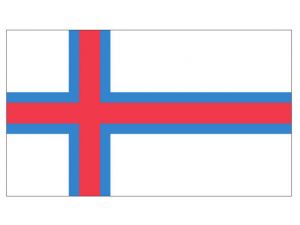Language/Faroese/Grammar/Verb-To-Be
Faroese language is one of the Nordic languages spoken in Faroe Islands, a group of islands that belong to Denmark. With its unique grammar and interesting vocabulary, it has recently gained attention from learners of foreign languages. In this lesson, we will focus on one of the most important grammar points in Faroese language, the verb "vera" (to be), in different forms and tenses, as well as how to make affirmative, negative, and interrogative sentences.
Verb "vera"
The verb "vera" is an irregular verb that means "to be" in English. It is used to form the present tense, past tense and future tense, in addition to other verbal forms. Its inflection is different from most other Faroese verbs, and it has its own set of endings.
Present Tense
In Faroese, the present tense of the verb "vera" is used to express what is happening now, habits or truths. The present tense of the verb "vera" is:
| Faroese | Pronunciation | English | |||||||||||||||
|---|---|---|---|---|---|---|---|---|---|---|---|---|---|---|---|---|---|
| eg er | [ɛa ɛɹ] | I am | tú ert | [tʉ aɹt] | You are | hann/hon/tað er | [hɔn ɦɔn tað eaɹ] | He/She/It is | vit eru | [vɪt æɹʉ] | We are | tit eru | [tɪt æɹʉ] | You (plural) are | tey eru | [tɛɪ æɹʉ] | They are |
- Examples:
- "Eg er studentur." (I am a student.)
- "Tú ert góð/ur." (You are good.)
- "Hann/Hon/tað er í bókini." (He/She/It is in the book.)
- "Vit eru fríggjadag." (We are free on Friday.)
- "Tit eru dansir." (You (plural) are dancing.)
- "Tey eru keldum." (They are cold.)
Past Tense
In Faroese, the past tense of the verb "vera" is used to express what happened in the past. The past tense of the verb "vera" is:
| Faroese | Pronunciation | English | |||||||||||||||
|---|---|---|---|---|---|---|---|---|---|---|---|---|---|---|---|---|---|
| eg var | [ɛa vaɹ] | I was | tú vart | [tʉ vaɹt] | You were | hann/hon/tað var | [hɔn ɦɔn tað vaɹ] | He/She/It was | vit vóru | [vɪt voʊɹʉ] | We were | tit vóru | [tɪt voʊɹʉ] | You (plural) were | tey vóru | [tɛɪ voʊɹʉ] | They were |
- Examples:
- "Eg var í Danmark." (I was in Denmark.)
- "Tú vart ikki har." (You were not there.)
- "Hann/Hon/tað var í skúlanum." (He/She/It was in school.)
- "Vit vóru á ferð." (We were on a trip.)
- "Tit vóru vælkomnir." (You (plural) were welcome.)
- "Tey vóru í hesum." (They were in this.)
Future Tense
In Faroese, the future tense of the verb "vera" is used to express what will happen in the future. The future tense of the verb "vera" is:
| Faroese | Pronunciation | English | |||||||||||||||
|---|---|---|---|---|---|---|---|---|---|---|---|---|---|---|---|---|---|
| eg verði | [ɛa vɛaɹdɪ] | I will be | tú verður | [tʉ vɛaɹdʉɹ] | You will be | hann/hon/tað verður | [hɔn ɦɔn tað vɛaɹdʉɹ] | He/She/It will be | vit verða | [vɪt vɛaɹdɑ] | We will be | tit verða | [tɪt vɛaɹdɑ] | You (plural) will be | tey verða | [tɛɪ vɛaɹdɑ] | They will be |
- Examples:
- "Eg verði læknari." (I will be a doctor.)
- "Tú verður góð/ur." (You will be good.)
- "Hann/Hon/tað verður stórt." (He/She/It will be big.)
- "Vit verða á ferð." (We will be on a trip.)
- "Tit verða í felagsskapinum." (You (plural) will be in the association.)
- "Tey verða í teimum." (They will be in them.)
Negative Sentences
In Faroese, you can make a negative sentence by adding the word "ikki" after the verb "vera". For example:
- Examples:
- "Eg er ikki títt." (I am not yours.)
- "Hann/Hon/tað var ikki kalt." (He/She/It was not cold.)
- "Vit verða ikki har." (We will not be there.)
- "Eg verði ikki præsti." (I will not be a priest.)
Interrogative Sentences
In Faroese, you can make a question by adding the interrogative word at the beginning of the sentence. Pay attention to the verb form. When the question starts with a subject (eg, tú, hann/hon/tað, vit, tit, tey), put the verb before the subject. For example:
- Examples:
- "Ert tú farin?" (Have you gone?)
- "Var hann/Hon/tað bókini?" (Was he/she/it in the book?)
- "Eru tey heima?" (Are they home?)
- "Verður tað væl?" (Will it be good?)
When an interrogative sentence starts with an interrogative word (hvar, hvat, hversu, hvussu, hvat fyri, etc.), the verb form in Faroese doesn't change. For example:
- Examples:
- "Hvar eru tit?" (Where are you (plural)?)
- "Hvat varst tú?" (What were you?)
- "Hvussu verður veðrið í dag?" (How will the weather be today?)
With these examples, you now have a good understanding of how to use the verb "vera" in affirmative, negative or interrogative sentences.
Conclusion
The verb "vera" is one of the most important grammar points in Faroese language. Understanding how to use this verb in its different forms and tenses will help you communicate more effectively and confidently. Furthermore, knowing how to make affirmative, negative, and interrogative sentences will enable you to express yourself in a variety of situations.
Remember, practice is key when learning a language! The more you practice, the more natural the language will become for you. Don't be afraid to make mistakes and keep practicing until you feel comfortable. With this lesson and the various tips provided, you'll be well on your way to mastering the verb "vera" in Faroese language!
Other Lessons
- Possessive Pronouns
- Plurals
- Regular Verbs
- Basic Adjectives
- Possessive Adjectives
- Adjectives
- Simple Past Tense
- Past Continuous Tense
- Negation
- Question Words

